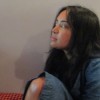Ode to Bahasa Indonesia
(with a line after Eka Kurniawan)
I.
Dark classroom in which I learn
to pare the fat of grammar,
of you & I. There is only
what I am to you &
you to me, & to speak,
I see what you see.
II.
Strange father, how can I tell
you how I’ve grown
I as my eye? What am I
without my God, mono-syllabic
anchor to earth? Since birth
you are you, I am me. You,
shard, pierced my eye.
Days of sofa, silence
edged by rhythms,
the strange family,ya?
I sank, a ship
dissolved by you. They
were they for seen &
seeing without speech.
How could we know the other?
Unless the duty of hands,
& food, trips to theme parks,
a museum, to reserve some
poetry, (& you, a novel
I’ll never read),
belly flops of meaning,
drops on the surface of
history: beautiful wound
of your country I can only love
with my eye (I).
Artist statement
When I started learning my father’s language at twenty, I was taught to avoid saying ‘I’ and ‘you’, which are considered distant, and to use kinship terms. These mark the lines of family and duty connecting the speaker to the person they’re talking to, about, or from the perspective of.
When I learnt this, I thought about the importance of ‘I’ to my native tongue (English), and, correspondingly, the centrality of ‘I’ to my way of being in the world. Remembering trips to visit my Indonesian father & his family as a teenager, it was clear that without a common language with which to communicate who ‘I’ was, I could not know my family, and vice versa. What’s more, the expectations of family often conflicted with my ‘I’, my autonomy, a sense of which my cultural upbringing in Australia had given me.
While I question my authority to write in/about Indonesia(n), I can only write from my way of being, from my eye (I), while always acknowledging its relation to Indonesia(n). Once I accepted this, Indonesia(n) became something I chose to learn and love, rather than a source of shame.

